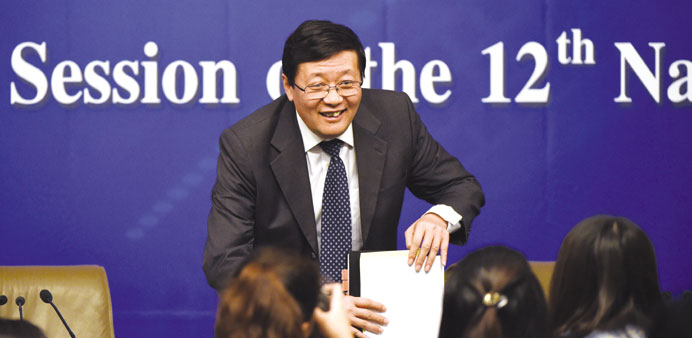Lou Jiwei at a session of the National People’s Congress in Beijing. Lou said yesterday that a further $31.9bn of planned spending was excluded from the original calculation for technical reasons, and incorporating it brought the deficit to around 2.7% of GDP, or 1.64tn yuan.
AFP/Beijing
China’s budget deficit this year will be higher than previously declared as the government boosts fiscal spending in a bid to bolster economic growth, the finance minister said yesterday.
Premier Li Keqiang said on Thursday in his “work report” to the National People’s Congress (NPC), the country’s Communist-controlled parliament, that the deficit would amount to 2.3% of gross domestic product, up from 2.1% in 2014.
But Lou Jiwei said yesterday that a further 200bn yuan ($31.9bn) of planned spending was excluded from the original calculation for technical reasons, and incorporating it brought the deficit to around 2.7% of GDP, or 1.64tn yuan.
That ratio is higher than that of the US, where the Congressional Budget Office, the independent agency that provides economic and budgetary analysis to the legislature, projected in January that the fiscal 2015 deficit would reach 2.6% of gross domestic product.
The actual US deficit is far larger, as its economy remains around double the size of China’s.
Japan’s budget deficit for the current fiscal year, which ends this month, is expected to be 5.2% of GDP. A 2.7% deficit would be China’s largest since the 2.8% recorded in 2009, when Beijing implemented a four trillion-yuan stimulus to ward off impact of the global financial crisis, according to data earlier provided by Chinese financial outlet Caixin.
“We have to take a moderately expansionary fiscal policy to cushion downward pressures (on the economy),” Lou told reporters at a press conference on the sidelines of this year’s NPC session.
The 2.7% ratio “will play a significant role in supporting economic development and fending off the downward pressures”, he said.
The world’s second-largest economy grew by 7.4% in 2014, the slowest pace in 24 years, amid headwinds including manufacturing weakness, falling property prices and high corporate and local government debt burdens.
Local government debt, often borrowed from state-owned banks through opaque financing vehicles controlled by authorities, is regarded by economists as a rising risk to China’s financial stability.
The National Audit Office put direct local government debt at 10.9tn yuan at the end of June 2013.
Local authorities will be allowed to issue a total of 600bn yuan in new bonds this year, Lou said.
From next year China will ban local governments from raising funds other than through bond issues, according to previous Chinese media reports, a move aimed at containing risks by making such liabilities more transparent.
“The risk of local government debt is generally controllable. We will pay more attention to some areas where the debt ratio is overly high,” Lou said.
China must implement an expansionary fiscal policy this year to help prevent a sharp slowdown in the economy, Lou said yesterday. China’s economy faces pressures from a weak global recovery and domestic constraints, including the need to cut debt levels gradually, Lou said
“To withstand the downward pressures, we must adopt an appropriately expansionary fiscal policy,” Lou said.
“We have to steadily deleverage, but must also prevent the economy from falling off a cliff.”
Chinese leaders have ruled out big stimulus measures as China is still struggling to deal with a mountain of local government debt, the hangover from 4tn yuan in spending rolled out during the height of the global crisis.
Local governments will repay more than 100bn yuan ($15.97bn) in debt this year, Lou said at news conference held during the annual meeting of the National People’s Congress, the country’s parliament.
Lou is forging ahead with fiscal reforms in a bid to deal with the root cause of local government debt piles that have amounted to more than $3tn.

